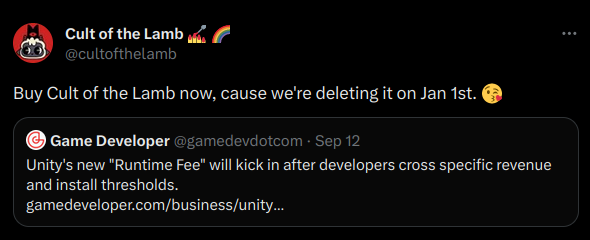In a move that sent shockwaves through the gaming community, Unity, the renowned game engine company, announced a policy change that's about as welcome as a White Walker at a summer barbecue. Some developers, like that of Cult of the Lamb, are taking a stand against what is a likely illegal and definitely dishonorable move.
Starting January 1, 2024, Unity plans to roll out a new 'Unity Runtime Fee' based on game installations. This fee will kick in once Unity-based games surpass certain revenue and installation thresholds, and is retroactive. The announcement has sent ripples of discontent across the developer community, with many voicing their concerns and frustrations.
The crux of the issue lies in the fee's structure. For games crafted using Unity's free tier, developers will be charged $0.20 for every game installation after their titles exceed 200,000 downloads and rake in more than $200,000 in revenue. Those utilizing the Unity Pro tier will face a reduced fee, and the thresholds for triggering these charges are considerably higher.
The ripple effects of Unity's announcement have been felt far and wide. Several high-profile developers have expressed their apprehensions about the new policy, with many pondering their future association with Unity.

